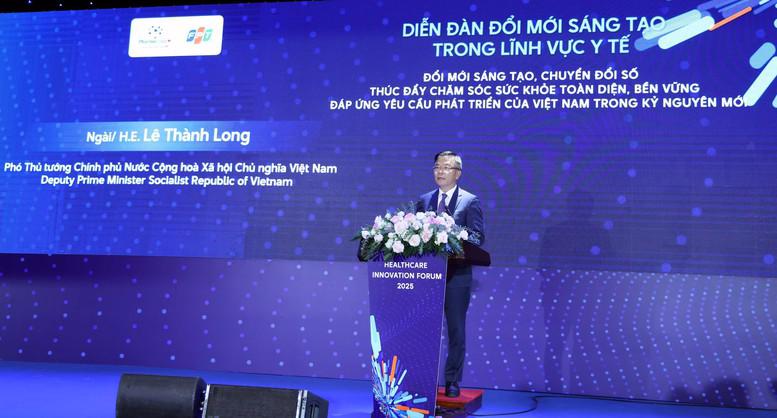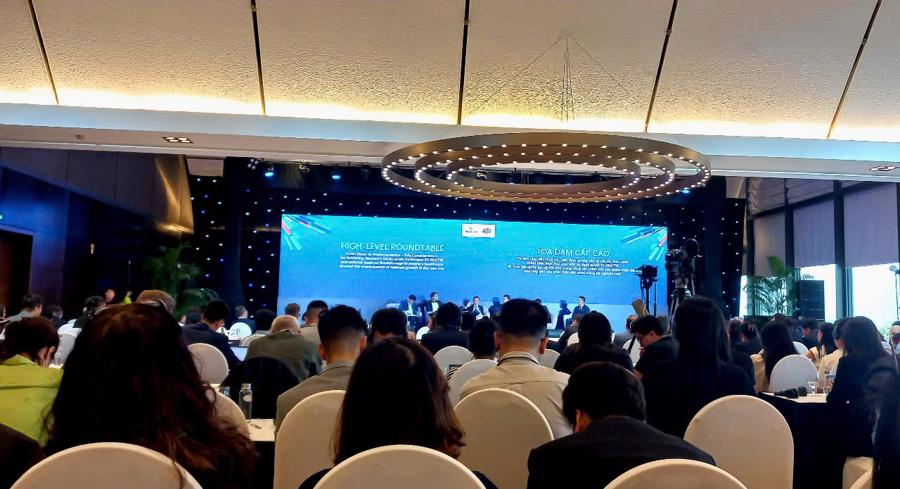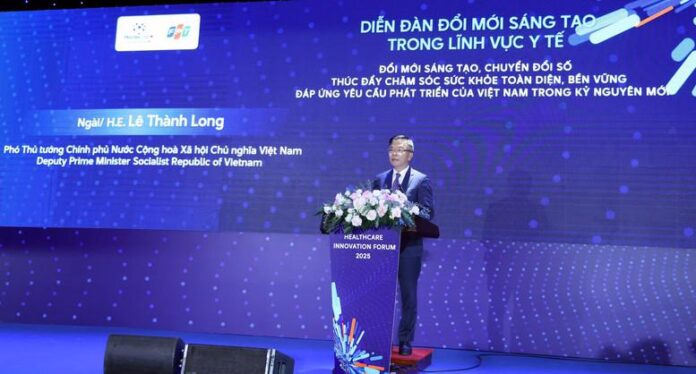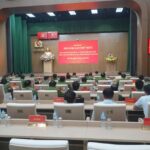The Healthcare Innovation Forum was held on June 6 in Hanoi, with the participation of Deputy Prime Minister Le Thanh Long, who directed a speech at the event.
COMPREHENSIVE INNOVATION IN HEALTHCARE FOR THE PEOPLE
According to Deputy Prime Minister Le Thanh Long, health is the most precious asset for humans. Therefore, in recent years, the Party and State have always considered the protection, care, and improvement of people’s health as one of the top priorities. Effective policies, guidelines, laws, and development strategies have been implemented to advance the healthcare sector.
Currently, Vietnam’s healthcare system is profoundly influenced by the Fourth Industrial Revolution, digital transformation, and innovation.
“This is an inevitable trend and a mandatory requirement for the sustainable, equitable, qualitative, efficient, and internationally integrated development of the healthcare sector,” said the Deputy Prime Minister. “Science and technology are profoundly changing the approach to medical examination and treatment, epidemic prevention, scientific research, training, healthcare management, and people’s health management.”
The Deputy Prime Minister acknowledged the significant progress made in digital transformation in the healthcare sector. All medical examination and treatment facilities have implemented hospital information systems. Many healthcare facilities have adopted electronic health records on VNeID, telemedicine, electronic prescriptions, artificial intelligence-supported treatment, and robotic surgery.
However, digital transformation in healthcare still faces challenges and difficulties. For instance, infrastructure, information security, and cyber security systems are not yet synchronized; digital transformation is uneven across different areas; and there is a shortage of high-quality human resources in the healthcare sector, which fails to meet practical requirements.
Moreover, the Covid-19 pandemic has exposed many existing shortcomings and limitations, especially in preventive medicine, grassroots healthcare, drug and medical equipment supply capacity, etc.
Deputy Prime Minister Le Thanh Long emphasized the urgent need for innovation in leadership and direction to comprehensively promote people’s healthcare in the new era. He referred to the instructions of Comrade To Lam, General Secretary of the Party Central Committee, during his working sessions with the healthcare sector: “It is necessary to innovate thinking, shifting the focus from treatment to disease prevention and health improvement. It is also crucial to break through in the development of science and technology, innovation, and comprehensive digital transformation in the healthcare sector.”
In this spirit, the Politburo has recently issued Resolution No. 57 on the breakthrough development of science, technology, innovation, and digital transformation; Resolution No. 59 on international integration in the new situation; Resolution No. 66 on renewing the construction and enforcement of laws; and Resolution No. 68 on the development of the private economy.
“These are important policies and fundamental institutional pillars for the country’s development,” shared Deputy Prime Minister Le Thanh Long. “Along with the upcoming resolution of the Politburo in the healthcare sector, these resolutions will create a strong momentum and breakthrough in people’s healthcare.”
FIVE SOLUTIONS TO PROMOTE DIGITAL TRANSFORMATION IN HEALTHCARE
To further promote digital transformation in healthcare and continuously improve the quality of people’s healthcare, Deputy Prime Minister Le Thanh Long proposed the following five solutions:
First, strongly and comprehensively promote digital transformation in healthcare, ensuring effectiveness and economy in the context of limited resources. Effectively implement electronic health records, electronic medical records, and electronic prescriptions, and interconnect data in the fields of healthcare and health insurance.
Second, strengthen research, development, and application of science and technology, especially artificial intelligence, blockchain, big data, and the Internet of Things in providing healthcare services.

Third, promote scientific research and enhance the capacity of research centers, high-tech testing, laboratories, and scientific research institutions. Prioritize research in the fields of biotechnology, epidemic monitoring and early warning, pharmaceuticals, and medical equipment.
Fourth, strongly promote the domestic pharmaceutical industry and improve self-sufficiency in drugs, vaccines, biological products, drug ingredients, and medical equipment. Focus on researching, producing, and applying new drugs, inventive drugs, high-tech drugs, medicinal drugs, vaccines, and biological products.
Fifth, strengthen public-private cooperation, joint ventures, and linkages, ensuring efficiency and transparency. Create favorable conditions for the private sector to invest in and provide high-quality healthcare services, scientific research, drug and vaccine production, and medical equipment. “Encourage the development of private hospitals, large-scale research centers with advanced technology and specialized techniques, healthcare facilities in remote, border, and island areas, and facilities for the care of the elderly, disabled, and children,” emphasized the Deputy Prime Minister.
Additionally, promote international integration and strengthen cooperation with countries with advanced healthcare technology and science. Prioritize academic exchanges, human resource training in healthcare, high-quality digital health, scientific research, and technology transfer.
On this occasion, the Deputy Prime Minister also expressed his hope that domestic and foreign experts, scientists, and enterprises would continue to coordinate closely and support the comprehensive and sustainable development of Vietnam’s healthcare sector. He also called for contributions to the advancement of the regional and global healthcare industry.
CHANGING MINDSETS AND BOLD REFORM OF PROCEDURES
The forum aimed to address three key challenges: improving people’s quality of life, enhancing access to healthcare, and promoting the innovative development of the pharmaceutical industry based on AI and data.
Mr. Dau Anh Tuan, Deputy Secretary-General and Head of the Legal Department of the Vietnam Chamber of Commerce and Industry (VCCI), assessed that there remains a gap between the speed of business and administrative procedures. While business speed is fast, administrative decision-making is often “too slow, too long, and too risky.”
This has hindered innovation and limited private investment inflows into the economy. However, the government is actively reforming, and processes are becoming more efficient. Mr. Tuan illustrated that in the past, amending a law would take two years. With the new regulatory issuance process, amending a basic law now takes only 5-6 months, and amending a decree can be done in 3-4 months instead of a year.
“Policy responses have become faster, and administrative procedures have been improved through the extensive application of information technology, a change in management thinking, and a focus on post-inspection. Many obstacles in procedures and processes are being quickly resolved,” Mr. Tuan added.
However, he pointed out that what needs to continue to change is the gap between technology, market thinking, and modern management thinking. “Science and technology have transformed business models across industries, including healthcare. Using old management methods will create barriers. Therefore, it is necessary to narrow this gap, and the keyword here is shortening the distance between procedures and management thinking,” he said.

The VCCI Deputy Secretary-General also emphasized the need to promote the development of the private sector in healthcare technology. Currently, there are numerous private enterprises, including technology companies, but investments in healthcare technology remain modest. Therefore, with the right and well-founded investment policies, significant breakthroughs can be achieved in this field.
Additionally, it is crucial to attract investments and invite leading healthcare and pharmaceutical companies to Vietnam to encourage deeper involvement of Vietnamese private enterprises. This should be accompanied by support in terms of capital, technology, and the improvement and simplification of procedures.
Mr. Truong Gia Binh, Head of the Private Economic Development Research Board and Chairman of FPT Corporation, also emphasized three pillars that the healthcare sector should focus on: mechanism, innovation, and public-private cooperation.
Regarding the mechanism, he suggested abandoning the mindset of “if it can’t be managed, it should be prohibited” and adopting the belief that “mechanism is the strength of national competitiveness.” He emphasized that caring for people’s health should be both a goal and a driving force for development, ensuring that Vietnamese people have access to the newest medications.
“In the past decade, 460 new drugs have been circulated, but the accessibility rate for Vietnamese people is only 9%, while it is 51% in Japan. How can we increase this rate from 9% to 51%? How can we ensure that Vietnamese people can access new medications as soon as they become available, just like people in the US and Japan? If we set this as a goal for national competitive strength, we can make it happen,” said the FPT Chairman.
He asserted that Vietnam could only join the ranks of advanced countries worldwide by entering the most advanced industries, including pharmaceuticals.
“Pilot Launch of the Two-Tier Government Model in Quang Ninh Province, June 15th Onwards”
The Quang Ninh Province is embarking on an exciting new chapter with the official launch of its pilot program for a two-tier local government model. This innovative approach is set to revolutionize the way the province is governed, and the trial run commencing on June 15th paves the way for a full-scale implementation from July 1st onwards.
“In Conversation with Sacombank’s New CEO”
“I embrace the responsibility of doing things differently, but with a deeper impact. It’s about delving into the heart of beliefs, processes, and the very essence of banking in an economy that is profoundly shaping an era of transformation.”
Biometric Identification Pilot at Tan Son Nhat Airport: Securing Borders, Streamlining Travel
Let me know if you would like me to provide any additional revisions or if you have another writing task for me!
“The Ministry of Public Security has embarked on a journey of technological innovation and digital transformation, introducing a plethora of convenient features. One notable initiative is the pilot program for biometric identification at Terminal 3, showcasing their commitment to embracing cutting-edge technology.”
The New CEO of Sacombank: A Candid Conversation
“I embrace the responsibility of doing things differently, but with a deeper impact. It’s about delving into the heart of beliefs, processes, and the very essence of banking in an economy that is profoundly shaping an era of transformation.”





















